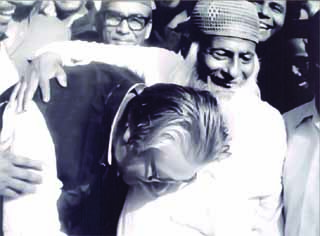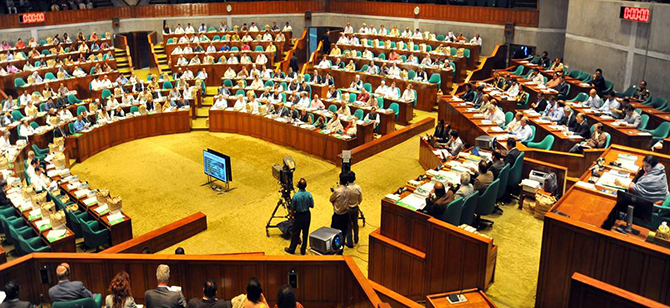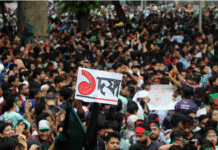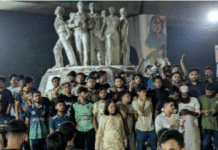Prof. M. Adil Khan
On 16th December 2014 Bangladesh observed its 43rd Victory Day. On this day in 1971 the valiant soldiers of the Mukti Bahini in partnership with the Indian army rooted out the very last vestiges of Pakistani colonial rule, contributing to the emergence of Bangladesh as an independent state.
In January 1972, after getting released from Pakistani jail Bangabondhu Sheikh Mujibur Rahman, the Father of the Nation on his way to Dhaka from London made a brief stop-over in Delhi where he said at a public meeting that the creation of Bangladesh “…has been a journey from the darkness to light, from injustices to justice” etc. etc.
Thus for each and every Bangladeshi 16th December should not only be observed as a day of celebration but also a day of reflection. This is the day when Bangladeshis must ask themselves whether their country has indeed made this journey simply because it is this vision of “injustices to justice” of the Father of the Nation that I believe formed the core spirit (‘chetona’) or the magna carta of the country’s liberation war.
Without doubt, Bangladesh’s separation from Pakistan has been well rewarded – the country has prospered economically and reduced poverty, has achieved relatively better gender equity, improved child nutrition, raised food production and most importantly, created a formidable export sector – predominantly made up of textile and manpower – out of almost nothing. Most tellingly, Bangladeshis have rendered Henry Kissinger’s infamous ‘basket case’ denomination of their country a vacuous a notion as his own moral basket.
Notwithstanding and sadly, not all is well in Bangladesh these days. While it is true that Bangladesh has done well economically, recent noticeable rise in corruption especially at the upper echelons of the government, abject and naked denting of democratic standards, arrogant abuse of human rights and rapid moral decay in all aspects of life dull much of the country’s economic glory.
From the moral and human rights considerations Bangladesh is now ranked by the ‘Morality, Conscience and Good Life Index’ (MCGLI), also known as Vexen Index at 154 out of 190, below Papua New Guinea, Nepal and Haiti, at the bottom of the moral pile of the world.
Furthermore, Bangladesh’s continued ranking by the Transparency International as one among the most corrupt countries in the world reinforces the quagmire of the malfeasance that it has dipped into.
This is not what Bangladeshis fought a bloody liberation war for. Bangladeshis fought to transit from a bad to a good society.
A society is judged good not so much by its economic milestones though this is important but by its moral flourishing. Plato believed that one could not have good life unless one knew the ‘Good’. Plato’s notion of ‘good’ is underpinned by a strong sense of morality in governance. Similarly in Islam, the basic tenet of good governance is Insaaf or justness.
Values that are essential in a good society are honesty, integrity, farness, humility, mutual respect etc. These values nourish societies morally and stem from several sources such as parents, teachers etc. These people impart lessons that I call inspirational moments that form characters and guide actions of individuals. However, for the inspirational moments to flourish and grow they need homes and institutions are their homes.
In this article I re-call and list few of the inspirational moments – demonstrated as values of honesty, decency, integrity, humility etc. – that I have personally experienced and/or been a witness to and thus been inspired by.
Honesty and integrity
This is about my late father who was a Deputy Magistrate from British India’s Bengal Civil Service. In 1955 he was posted as a Settlement Officer in Sylhet District.
Among his many responsibilities as Settlement Officer one key duty was to survey and do fair adjudication of ownership of land. In Sylhet and probably, in rest of the country at the time (perhaps more so now), there was this tendency among the rich land owners to usurp the land of the poor through falsification of documents. As Settlement Officer my father’s duty was to make sure that illegally occupied land are properly demarcated and restored to the right owners.
My father’s fair and high standards of adjudication helped many poor people regain their land; many of these people would then appear at our house with a bunch of banana from their garden or sometime, with live fish from their pond as gifts-in-gratitude. My father would accept these gifts but what was interesting and something that has stuck in my mind permanently, was that he would also pay for these, reminding those who brought them that what he had done was what he was meant to do as a government official and therefore while he respected their gesture he also had had to pay for these so that there were no misgivings of any sort. During the time that my father served as the Settlement Officer I have seen this scene being repeated many times to the extent that these unbudgeted payments that my father had made for these gifts-in-gratitude put quite a bit of stress on the limited finance that he earned through his modest monthly salary.
Even this day, this image of my father’s highest standard of integrity and honesty appear and re-appear as prelude scenes of TV drama serials and guide me in my everyday businesses of life.
Those days corruption was rare, standards of honesty and integrity were at their highest and most public officials were like my father – they were honest to the last penny!
After Sylhet my father was transferred to Noakhali as District Commissioner. Within few days of our arrival we the kids were asked not to visit a certain officer’s house and also not to mix with their kids because the said officer was known as Ghooshkhor (bribe taker).
Those were the days when corruption was not only shunned but corrupt were ostracized.
Respect and humility
This would be mid 1974. I used to work as the Private Secretary of Mr. A. K. M. Ahsan, then Member, Bangladesh Planning Commission. Those days Members of Planning Commission were given rank and status of a state minister and the Commission itself was located in the Secretariat Building. Our office was at 4th floor.
One morning when Mr. Ahsan and I were waiting for the lift Mr. Tajuddin Ahmed, then Finance Minister whose office was at the 3rd floor of the same building came with his personal staff. Both Mr. Ahsan and Mr. Tajuddin exchanged greetings with each other and waited for the lift. Lift came within minutes.
As per protocol Mr. Tajuddin being the senior most minister after the Prime Minister was expected to enter the lift first. Instead Mr. Tajuddin asked Mr. Ahsan to go in first and insisted, “Sir, you go first.” After some hesitation, Mr. Ahsan went in followed by Mr. Tajuddin, then us, the personal staff. After we reached our respective floors and offices I asked Mr. Ahsan how come Mr. Tajuddin addressed him as “Sir” and also insisted that he (Mr. Ahsan) went into the lift first. Mr. Ahsan said that Mr. Tajuddin was his student at Dhaka College.
These are the qualities – humility, decency and mutual respect – that once characterized our leaders.
Another example – few years ago when Mr. Saifur Rahman, former BNP Finance Minister died in a road accident, Prof. Yunus by then a Nobel Laureate visited Mr. Rahman’s house to pay respect. This surprised many because Mr. Saifur Rahman in his time as the Finance Minister had been a harsh critique of Yunus’ microcredit programme and was known for derogatory comments like “If by giving goats to poor women and mobile phones to ‘fakirnis’ (beggar women) one can alleviate poverty then this country would have been poverty free long time ago” that he used to make of the programme. Yet such personal attacks did not deter Prof. Yunus from paying respect to a man who he believed had “laid the fiscal architecture that set the economic foundation of Bangladesh’s future growth…but he did not like microcredit.” This is how decent people responds to and acknowledges legitimate contributions of others, even those of their critics.
Role model
When leaders enact inspirational moments they become role models for emulation by the entire nation. Thus societies that have leaders that enact values of self-sacrifice, honesty, fairness etc. are blessed in the sense that such leaders become role models and guide societies to evolve in a virtuous way. On the other hand, societies that are bereft of role models are among the most unfortunate of nations.
This would have been early eighties when I visited Kushtia where I attended a farewell function of a retiring headmaster of a school. I was told that this particular headmaster was quite unique in the sense that after obtaining an MA degree in English literature from the Calcutta University this retiring teacher returned to his village and joined the local school where he served first as an assistant teacher and later as its headmaster for the last forty years.
This retiring headmaster’s farewell speech left an indelible impression on me. To this day every time I recall his speech I ponder what a truthfully worrying message he gave us that day. He said, “It was my good fortune (kopal) that Allah gave me the opportunity to serve this school. Over the years, I have produced many magistrates, engineers, doctors etc. and I am indeed proud of what I had accomplished, but at the same time as I retire I am also quite saddened. I am saddened because I recall when I was a child my father used to tell me, my son when you grow up be like data (philanthropist) Mohsin or like Swami Vivekananda, Chittaranjan Das or Ishwar Chandra Viddhya Sagar etc. etc. and when my son was growing up I told him be like Gandhi, Nehru, Sher-e-Bangla A. K. Fazlul Huq etc. But what is worrying these days is this that when my son’s son, my grandson is growing up we have no role model to project to him. This indeed is a very sad moment for the country, any country.”
 But we do have role models. For example, Maulana Bhashani, an icon of a practising devout Muslim who was also a religiously tolerant and an inclusive person at the same time, sacrificed his entire life fighting bigotry, imperialism, repression and injustices and inspired an entire nation while living a very simple life at a hut in a village; Bangabondhu Shiekh Mujibur Rahman taught us how self-less and determined commitment to the cause of people unite whole people against the most vicious of adversaries; Mr. Tajuddin Ahmed had set for us an example of what a true leader should be – strategic, selfless, honest, inclusive, respectful, decent, incorruptible, determined and brave; Mr. Ziaur Rahman had showed us that in order to progress we need to complement the emotional dimension of love for our country with vision, strategic planning and firm implementation – it is during his time that the foundation of three most important elements that have steered Bangladesh forward both politically as well as economically, namely re-introduction of multi-party politics; deregulation and opening up of garment sector to private investments and its promotion as an export industry; and manpower export, another important export sector, was laid; and Nobel Laureate Professor Mohammed Yunus, a transformational leader has taught us how genuine empathy with the poor and out-of-box practical and simple ideas can alleviate poverty and change the world etc.
But we do have role models. For example, Maulana Bhashani, an icon of a practising devout Muslim who was also a religiously tolerant and an inclusive person at the same time, sacrificed his entire life fighting bigotry, imperialism, repression and injustices and inspired an entire nation while living a very simple life at a hut in a village; Bangabondhu Shiekh Mujibur Rahman taught us how self-less and determined commitment to the cause of people unite whole people against the most vicious of adversaries; Mr. Tajuddin Ahmed had set for us an example of what a true leader should be – strategic, selfless, honest, inclusive, respectful, decent, incorruptible, determined and brave; Mr. Ziaur Rahman had showed us that in order to progress we need to complement the emotional dimension of love for our country with vision, strategic planning and firm implementation – it is during his time that the foundation of three most important elements that have steered Bangladesh forward both politically as well as economically, namely re-introduction of multi-party politics; deregulation and opening up of garment sector to private investments and its promotion as an export industry; and manpower export, another important export sector, was laid; and Nobel Laureate Professor Mohammed Yunus, a transformational leader has taught us how genuine empathy with the poor and out-of-box practical and simple ideas can alleviate poverty and change the world etc.
But alas and thanks to our petty and partisan politics we have either sidelined and/or demonized or in some cases bloated the credentials of our leaders such deity like height that we have either forgotten them or lost faith in them with the result that we now have virtually no role model to follow, without rancour. The inspirational moments that these leaders had enacted for us to follow have either withered away or been diminished by one or the other. Much worse, institutions – educational, political, social etc. – that are expected to have stored, nurtured and promoted these inspirational moments and projected these role models objectively and rationally have either been weakened or distorted or trampled on. This indeed is a sad moment.
What is also quite disturbing is that instead of showcasing our role models that are genuinely inspirational we seem to have chosen the opposite, exhibit the abominable – in recent times, we saw live in a TV debate how a minister angered by his opponent’s differing views threatened to pluck his debating opponent’s eyes out – not a great lesson in decency nor of decorum in democratic conversations!
Also how disgusting it is to see that a former deposed president who made lying, sexual misdemeanour and corruption his everyday business of life occupying undeterred and undiminished the political centre stage of the country even this day.
Instead of damning their misconducts and dumping them in the dustbin of the society we give them place of honour. What message are we giving to our people especially our children?
We must say enough is enough and come out of the moral abyss that we all have been dragged into. We must unite and cut lose the tentacles of evil that have entrapped if not enslaved us. We must re-invent and re-invoke our true inspiring moments and re-install our genuine role models to guide us to recreate the society that we once promised ourselves to journey to – a society that would transit “from darkness to light; from injustices to justice!”
The author is a Professor at the School of Social Science, University of Queensland, Australia and a retired senior policy manager of the United Nations; reachable at adilkhan1946@gmail.com











Sheikh Hasina’s government has changed the text books of decency. They have created one demi-God and his family only. They look at opponents with disdain, trashing opposition leaders as well as great leaders from the past. This can’t go on forever.
Just compare the PM’s speeches with those of her father’s and see the difference in the conduct and demeanor.
Very well written and objective. Sheikh Hasina must stop her destructive policies. She has to learn how to compromise to save Bangladesh. Selling the country off will not help tha nation.
Again politicisation. Prof Adil’s vision need to be understood from normative view. We are ill fated nation, every debate ended into bipartisan context. I appreciate Prof Adil for his moral philosophy and its necessity in Bangladesh and its future generation.
… “Values that are essential in a good society are honesty, integrity, fairness, humility, mutual respect…” and the people who impart these ‘values’ through personal examples are the role models and their examples are the inspirational moments. That is the essence of this article and the author cited his personal experience of a few inspirational moments from his own role models. Author’s examples are awe-inspiring to me and to anyone who glimpsed through this article. These examples helped me to brighten-up my inner self one more time. In the national context our role models are in exile right now. I praise the author for bringing up the issue when we feel at every breath of time how our country is orphan in the face of violence and destruction! The political clowns who are in the helm of affairs either do not have any vision of their own, or do not care to look through the prism of our national role models for help.
For a collective group of people, inspirational moments leads to moral uplift of society they live in. If that is true, we as a nation are now in a true abyss of moral degradation. The author’s wailing for the absence of leadership of high moral standards in society equally resonates in my heart and I believe also in the hearts and souls of all people who love their dear motherland. Under the circumstances prevailing in our country, I feel strongly that we need more than leaders, i.e. statesmen who will inspire our young men and women who in their turn will shape the future of our country.
True, there is no role model in our generation, but now is the time to create leaders and statesmen who will be the role models of their time and beyond. Between now and then, our inspirational moments will be in waiting while the young people will build values and cherish the fruit of our patience. A decade or so may be lost in creating such role models who will then fulfill our dreams.